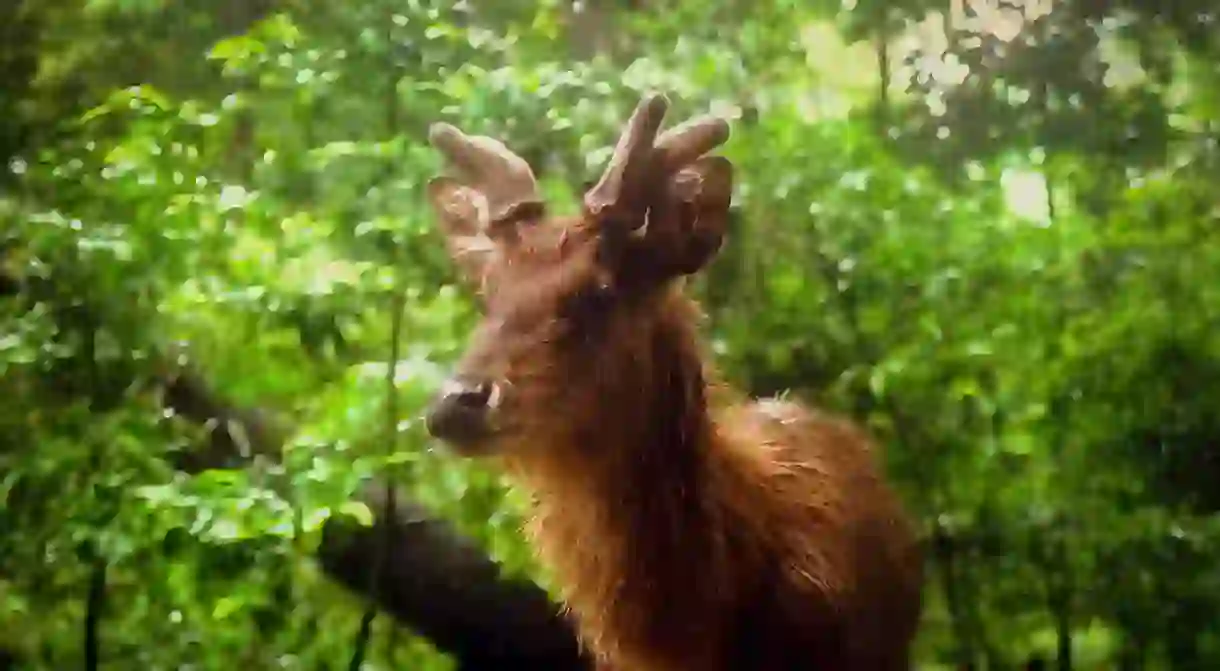Where to Find Indonesia's Incredible Wildlife

Indonesia has a fascinating and diverse culture contributed by hundreds of different ethnic groups. And while that does make the country special, let’s not forget a huge and equally important portion of the archipelago’s inhabitants. Read our guide on where to find Indonesia’s incredible wildlife.
Tanjung Puting National Park
Park
Located in the world’s lung Borneo, this area is surrounded by lush tropical jungles, making it a perfect natural habitat for various wild species, including the adorable orangutan primates, pythons, the endemic bearded pig, as well as tropical plants. The park covers 416 hectares of forest, swamps, mangrove, and beach, each with different wildlife ecosystem to observe. Tourists can also volunteer for the park’s orangutan conservation efforts.
Baluran National Park
Park

This national park is often dubbed “Indonesia’s little Africa”, and for good reason. Compared to other national parks that are dominated by lush tropical forests, this location has a dry climate that sustains different sets of plants, birds, and mammals ecosystem. The area covers vast mountainous areas and savanna, where endangered mammals like banteng, Java mouse-deer, fishing cat, Javan leopard, and the Javan lutung roam free. Also in the neighborhood are hundreds of endangered plants and endemic birds. Standing tall at its center is the extinct volcano Mount Baluran. Tourists can sign up for an organized safari tour arranged by the park to ensure a more convenient and safe adventure.
Kerinci Seblat National Park
Park
This expansive national park spans over four provinces in Sumatra, covering various different landscapes including Indonesia’s second highest volcano peak, Mount Kerinci. The diversity of terrain makes the national park a perfect home to a mixture of amazing creatures, including protected species of tiger, rhinoceros, and birds. Beyond the animal kingdom, more than 4,000 flora can be found within the area, including the world’s largest flower Rafflesia arnoldi and also the tallest flower Titan arum.
Komodo National Park
Park

Although it’s named after the curious ancient species of komodo dragons, this national park is home to much more biodiversity. Here, “the last dinosaur on earth” shares the land with Timor deer, turtles, and a wide variety of birds. Below sea level, the park’s wildlife activity gets even more lively, with more than a thousand species of tropical fish, coral, and sponges, many of which are exclusive to the lesser Sunda area. All that wildlife is packed within three large islands and smaller islands, each with gorgeous views of beaches, jungles, and hills.
Way Kambas National Park
Park
As one of the oldest nature reserves in Indonesia, this national park has been the home to rare species that have been endangered for many years, including the Sumatran elephants and Sumatran two-horned rhino. Although widely known for its elephants, this area is also frequented by local bird watchers, who hope to spot the white-winged duck and Storm’s stork among others. Tourists can take a guided tour through the elephant forest and opt for a journey through the Way Kanan river by canoe to witness the park’s many habitats.
Gunung Leuser National Park
Natural Feature, Park, Forest

For wildlife enthusiasts who fancy a real jungle experience, this conservation area is among the most pristine and wild in Indonesia, especially the part that belongs to the Special Region of Aceh. The diverse wildlife is thriving, sustained by dense vegetation and untouched nature, leading this location to be referred to as a “complete ecosystem laboratory”. Contrary to confined animals at zoos or some other conservation centers, the orangutans, monkeys, elephants, and rhinoceros in this park are at least semi-wild, or even wild.
Raja Ampat Islands
Natural Feature
Raja Ampat Islands have been one of the world’s most-prized diving spot, boasting at least 550 species of coral and 1,400 species of fish, including whale sharks, manta rays, pygmy seahorse, and more. But not all of the archipelago’s wildlife require a diving or snorkeling gear to observe. Of the 1000 small islands that comprise the archipelago, many of them have a vibrant forest ecosystem, such as spotted cuscus, colorful wild flowers, and many species of the elusive birds-of-paradise.
Tangkoko National Park
Park

Located in less-traveled eastern Indonesia, this nature reserve does not receive as much credit as it deserves. Sulawesi itself is one of Indonesia’s foremost wildlife fronts, supporting the lives of countless endemic and exotic species. At 8,890 hectares, Tangkoko has more than tourists could ever hope for, including the Sulawesi’s prima donna bird, the Maleo. A stroll through the jungle pretty much guarantees encounters with unique species like the world’s smallest primate Tarsius and black tailless monkeys.
Ujung Kulon National Park
Park
The historic Krakatoa explosion in 1883 was massive enough to eliminate human civilizations, but apparently not enough to prevent the wildlife from thriving in this deserted area. For decades, the peninsula was inhabited only by various flora and fauna, making it a valuable nature reserve in West Java. The protected park is home to numerous endangered animals and plants species, including the iconic one-horned rhinoceros, Java mouse-deer, silvery gibbon, and more.













